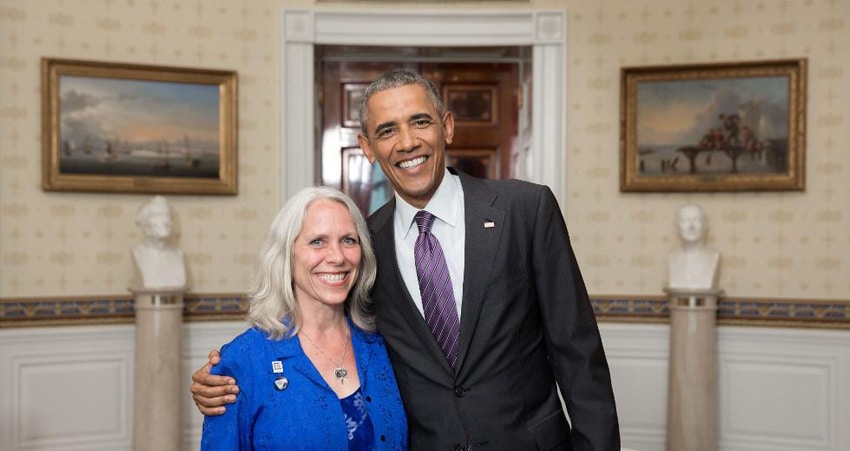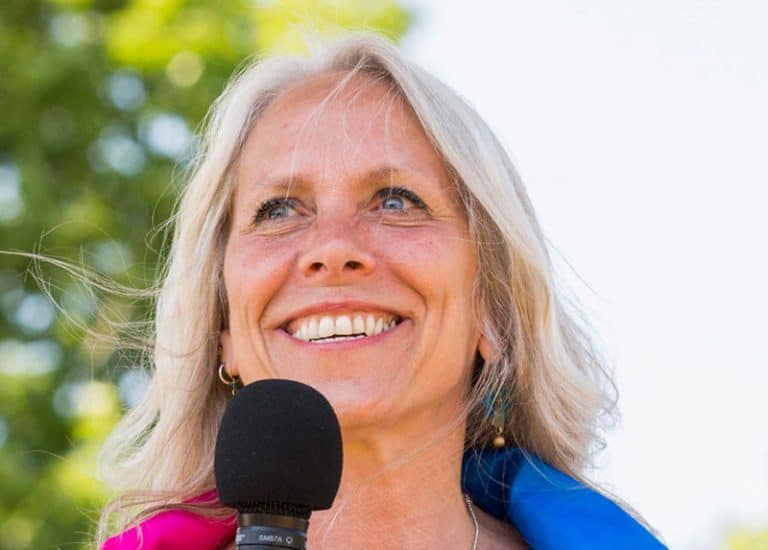Good to know: Robyn Ochs and her fight for the bi+ community
This year’s Bi Visibility Day sparked a wave of discussions, testimonials, and a handful of arguments on social media revolving around the too-often-marginalised group standing for ‘B’ in LGBTQ: bisexuals.
Screen Shot spoke to Robyn Ochs, one of the pioneers of bi activism, in order to get her viewpoint on both the struggles and achievements of bisexual individuals, and find out what she envisions for the community in the years to come.
For several decades, Ochs has been on the frontlines of LGBTQ activism through her work as a writer, teacher, and speaker. From serving on the board of MassEquality, a grassroots organisation advocating for the legal rights of LGBTQ+ people in Massachusetts, to publishing books and running programs and workshops across the U.S., Ochs has been continuously promoting LGBTQ protections and rights. One of the reasons she stands out as a queer activist, however, is her long and relentless fight for the recognition, visibility, and equality of people identifying as members of the bi+ community.
“On Bi Visibility Day I wore a very obviously bi t-shirt all day long,” said Ochs, “in airports, and everywhere I went. I did it because I find it very easy to wear an LGBTQ t-shirt all day every day, but harder to wear a bi t-shirt, because I know I’ll bump up against a lot of stereotypes when I do that.”
Ochs is widely known for her monumental quote, which has been embraced by many as the most precise and inclusive definition of bisexuality: “I call myself bisexual because I acknowledge that I have in myself the potential to be attracted—romantically and/or sexually—to people of more than one gender, not necessarily at the same time, not necessarily in the same way, and not necessarily to the same degree.”

The bisexual identity label strikes many, both within the queer community and outside of it, as an enigma. Often, people doubt bisexuality even exists, while others stigmatise bi individuals as greedy, untrustworthy and dishonest. “Within the LGBTQ+ community, the most frustrating stereotypes for me are that we are not true ‘citizens’, that we are not fully committed to the LGBTQ+ movement, that we don’t experience oppression… that it’s easy to be bisexual,” said Ochs. “What I reference in this is the data—that identifying as bi comes with its own mountain of stereotypes, which are not exactly the same as the stereotypes that gay men and lesbians have to deal with.”
In her work, Ochs attempts to debunk the many stigmas surrounding bisexuals, and shine a spotlight on their unique struggles for self-determination and recognition. She does so, for instance, in her two published anthologies, Recognize: The Voices of Bisexual Men and Getting Bi: Voices of Bisexuals Around the World, in which she presents essays, fiction, poetry, and other writings penned by bi+ individuals and offers glimpses into the complex and rich world of this community. Through her writings, speeches, and programs, Ochs also offers tools and resources for people struggling to embrace their bisexuality, advice for parents and allies who wish to support their loved ones, as well as addresses some of the most pressing hurdles and disparities the bi+ community faces, one of which is access to healthcare services.
“Bisexual people face a lot of health disparities, similar to and in some cases even higher than lesbians and gay men,” says Ochs. The data emerging in recent years confirms Ochs’ claims, and portrays a rather grim picture regarding both the mental and physical health of members of the bi+ community.
In a recent survey, the Human Rights Campaign (HRC) states that, “Compared to other groups in the LGBTQ community, bisexuals face striking rates of poor health outcomes ranging from cancer and obesity to sexually transmitted infections to mental health problems.” HRC data further indicates that bisexual individuals are significantly more prone to depression, suicidality, and anxiety, and that only “13 percent of bi+ youth received information about safer sex that is relevant to their identity”. “We need to educate healthcare providers,” Ochs stated, “It’s a topic that needs a lot of attention because healthcare providers are not, generally, educated about LGBTQ issues through their curriculum, and bisexuality is rarely, if ever, covered.” Ochs’ current program addresses precisely this problem. Throughout October, she will be travelling across the U.S. discussing bisexual health at medical schools and hospitals’ conferences.
Health disparities among LGBTQ+ individuals will be extensively covered in Bodies and Barriers, an anthology that will come out in January 2020 and will include a chapter written by Ochs on bisexuality. “I wrote a chapter about some of the very specific negative and positive experiences that bi+ people had had with healthcare providers, with the hope that if you are a healthcare provider it will help you be more culturally sensitive and aware of what some of the fears and challenges that people who identify as bi+ face.” “I believe that that’s one of the areas we need to address moving forward, we need to reduce the disparities,” she added, “It needs to not be so hard to identify as bi. We need to make it a more comfortable identity for people to hold.”
Yet despite the significant disparities and pervasive stereotypes faced by bisexuals, the community has nonetheless been making notable strides as far as being visible, Ochs claims. “We’re starting to show up in popular culture. More and more actors and artists are coming out as bi or bi+ or pan or queer. If you asked me to list a hundred people who have come out as bi or bi+ in popular culture or the media I could probably get pretty close these days, off the top of my head, without notes. If you had asked me that question 20 years ago I would be counting on one hand. And that’s a huge change,” said Ochs. “They’re doing a huge service in the interest of complexity. They’re holding out their identities and they’re doing so publically, proudly, and without apology, and there’s power in that.”
Another indication of increasing bi visibility lies in the rising percentage of young people identifying as bi. Ochs pointed out that a Centers for Disease Control (CDC) survey of high school students in the U.S. from 2015 found that 2 percent of the respondents identified as lesbian or gay, 6 percent as bisexual, and 3.2 percent as ‘unsure’. The same type of survey from 2017, however, reported that, nationwide, 2.4 percent of respondents identified as gay or lesbian, 8 percent identified as bisexual, and 3.6 percent were unsure of their sexual identity. “And so that’s another place bisexuality is showing up, it’s showing up in the actual identities of young people—starting with millennials, and moving down to youth,” said Ochs. “The percentage of people identifying outside of straight is going up pretty consistently every year, and the number of people identifying as bisexual is going up most of all.” That kind of data is very powerful,” Ochs said, adding that she would like such information to become more well-known, “If you’re in tenth grade and you’re coming out as bi and you see that data, you say ‘eight percent, huh? Okay, I’m not alone’. That’s validating.”
Ochs believes that the best way to make bisexuality a more comfortable label to embody in the long run is to keep spreading our stories, both among family and friends, as well as in the media. “We need a lot more cultural production,” she said, “We need to create novels and stories and plays and anthologies and YouTube videos and films and theatres because I believe that understanding comes largely through story-telling. So we need to figure out as many ways as possible to get bisexuality represented in a good way. To create narratives, create visibility.”
Bi+ individuals have a long way ahead when it comes to achieving true equality and recognition, and overcoming the challenges associated with living life outside the binaries. Yet we must remind ourselves that the cause of our hardship is also what makes us unique and powerful. It helps to have the guidance of leaders like Ochs, but it is ultimately up to each of us to take up the torch and illuminate our surroundings, often simply through our unfiltered presence. Ochs’ message to us is clear: “Get out there.”





